How Long Can Cottage Cheese Be Kept Frozen
Your local grocery store has cottage cheese on sale, and you want to take advantage of it. The issue is that you're not sure how well this soft cheese freezes and if it will be any good after thawing. And because the sale is coming to an end soon, you don't have time for a test run.
In other words, you need to know right now whether stocking up and freezing this popular dairy treat makes sense or not. Can you freeze cottage cheese?
This guide is here to help you figure out what's the best course of action here. While freezing cottage cheese is definitely a possibility, it doesn't freeze as well as let's say butter. In short, thawed cottage cheese works well only in a handful of uses. And if none of them work for you, freezing it probably doesn't make sense. Let's dive into the details.
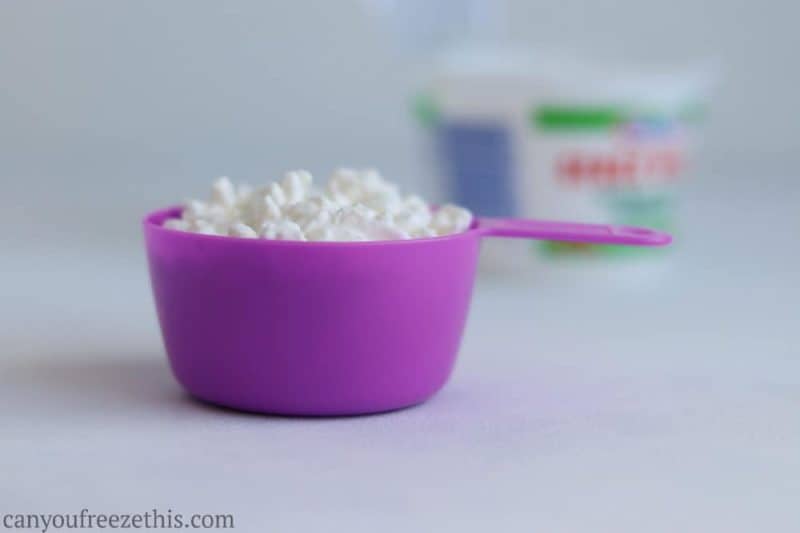
Can You Freeze Cottage Cheese?
Truth be told, there isn't a straightforward answer to this question. While you definitely can throw this popular dairy treat to the freezer, it won't come out as tasty and good-looking after thawing. And in some cases that fact is super important, while in others not so much. Same thing is true for other cheeses, like mozzarella or Brie.
Like most dairy products, freezing and thawing change the consistency of cottage cheese. That's why most brands don't recommend it (DB). While freezing doesn't change its nutritional value, it alters its texture, sometimes significantly.
Besides that, cottage cheese might also lose some of its taste. That's a pretty big deal if you plan on eating it by itself. Fortunately, there are many other ways one can use this dairy treat.
For frozen and thawed cottage cheese, cooked dishes are what we're interested in. That means soups, sauces, pies, or anything you prepare on the stove.
In those dishes, the texture is not that important because it will be altered during cooking anyway, so thawed cottage cheese works quite well in them. The same is true for kefir.
If you already have in your repertoire some recipes with cooked cottage cheese, you're good to go. If not, no worries, as I give you a couple of ideas later in the article. But, just to reiterate, if you want to freeze cottage cheese to then eat it by itself, you might be disappointed about the results.
In case you were curious, that's how defrosted cottage cheese looks like:
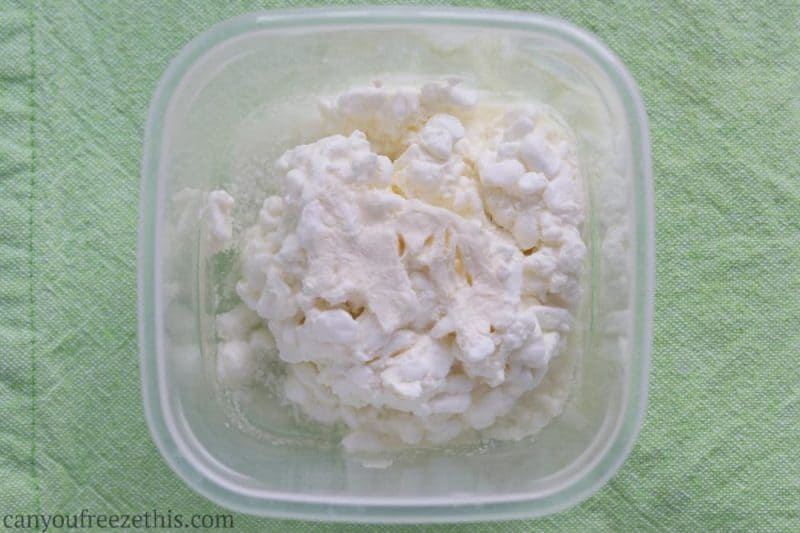
How To Freeze Cottage Cheese?
Before we get into the freezing process, let's first talk about choosing cottage cheese to freeze. The most important thing to know is that full-fat or large-curd varieties freeze better than their low-fat or fat-free counterparts. And, like with many other products, some brands freeze better than others. Thus feel free to test different ones to find the one that works best for you.
When it comes to the freezing method, it's quick and simple. Here's how it goes:
- Figure out portions. Think about how you're going to use the dairy product once it's thawed and portion it accordingly. I need half a cup of cottage cheese for my recipe, so that's what I'm going for. When in doubt, go with smaller portions. You can always thaw two or more if need be, but you can't defrost half a portion.
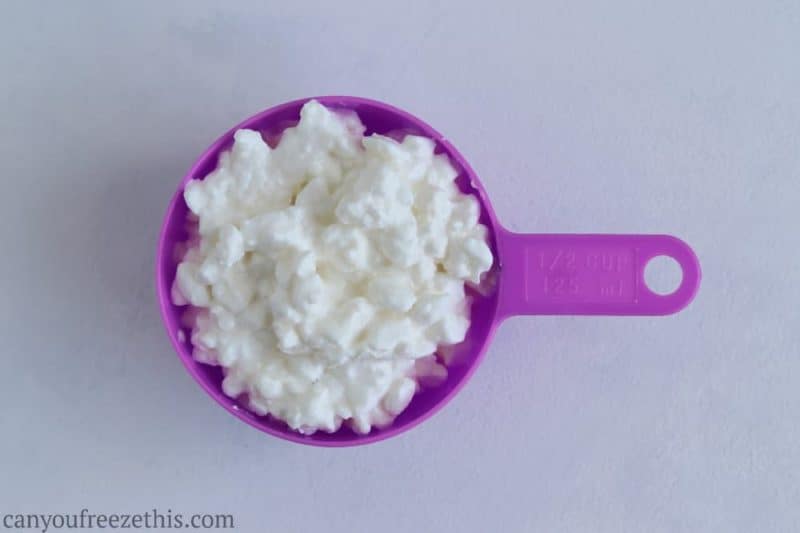
Cottage cheese portion - Transfer the cheese to containers or reusable freezer bags. Generally speaking, freezer bags are a better option because you can lay them flat in the freezer, and there's little risk of freezer burn. If you go with containers, over time freezer burn will set in, so for long term storage bags are the way to go. Make sure the bags are not leaky and remove all air from them before sealing.
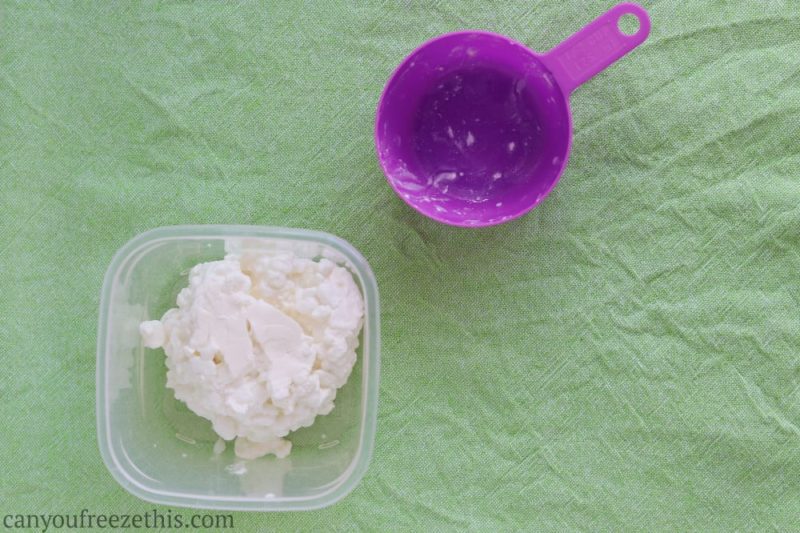
Cottage cheese prepared for freezing - Throw the containers or bags into the freezer. If you find it useful, add a label with name and date.
That's it. I told you it's super simple and I'm pretty sure it took you like 5 minutes tops.
How To Defrost Cottage Cheese?
When it comes to thawing, you have a couple of options:
- Overnight in the fridge. The traditional way of thawing works for cottage cheese too. Throw the bag or container into the refrigerator in the evening, and it should be done by morning. Please remember that larger portions defrost longer, so plan accordingly.
- In cold water. If you only have a couple of hours before you need to cottage cheese, a cold water bath is the way to go.
- Throw it in frozen. If you're cooking a soup or a stew and forgot to thaw the cheese, you can always add it frozen. Submerge the container or bag in cold water for a couple of minutes, so the surface defrosts, and you can easily remove the frozen cottage cheese. Add a couple of minutes of cooking time to account for defrosting, and make sure to stir it from time to time so the dairy product thaws and spreads evenly.
Once you're done defrosting, drain the excess moisture. The cottage cheese will be watery, and if you're making something like pancakes, that water definitely won't help. If it turns out too dry, consider adding some cream or sour cream.
How To Use Defrosted Cottage Cheese?
As I already mentioned, frozen and thawed cottage cheese works well in many cooked dishes. Here are a couple of options to choose from:
- Soups (especially if you're a fan of creamy soups)
- Cakes (cheesecake, anyone?)
- Casseroles and pasta dishes
- Pancakes (yes, pancakes with cottage cheese are a thing)
Here are some pancakes I made with the cottage cheese I froze (recipe):
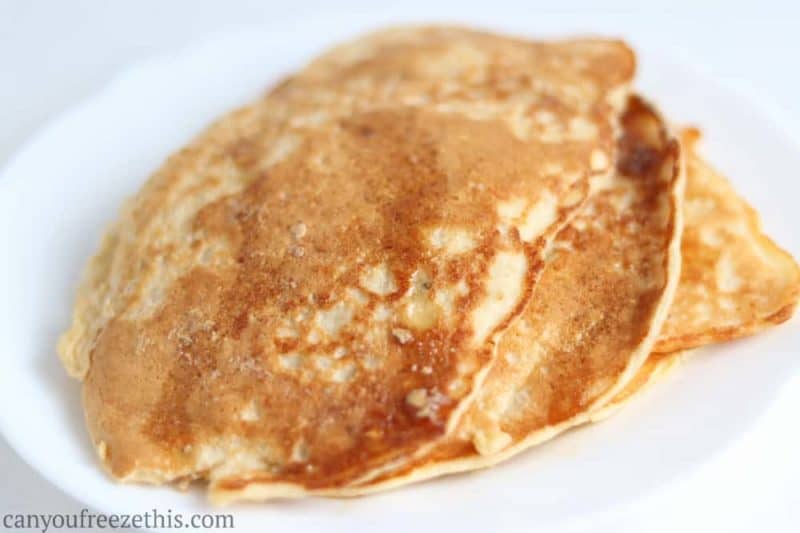
There's no guarantee that the frozen and thawed cottage cheese will work well in your favorite cooked recipes. So before you prepare a dish with it for your guests on an important occasion, run a test when the stakes are low.
How To Tell If Cottage Cheese Has Gone Bad?
Telling good cottage cheese from a spoiled one is rather easy. Here are the signs that your cottage cheese is done for:
- The cheese has turned yellowish.
- It smells sour or off in any other way. Cottage cheese usually has a light and fresh smell that's nowhere near sour.
- Taste turned sour. Cottage cheese isn't sour cream and it shouldn't taste like one.
In a couple of places online you can read that the texture of cottage cheese should be consistent, or else it's bad. That's not true. Some separation is perfectly natural (DB). Sometimes you might open a new container and find its contents somewhat separated, but more often it happens to cottage cheese that's already opened and sits in the fridge for a couple of days. Give it a good stir, and things will blend back together.
References
- DB Daisy Brand: FAQ
About the Author

Marcin is the managing editor of CanYouFreezeThis.com. He is making sure all the freezing info on this page is accurate and the posts easy to digest and use.
How Long Can Cottage Cheese Be Kept Frozen
Source: https://www.canyoufreezethis.com/freeze-cottage-cheese/